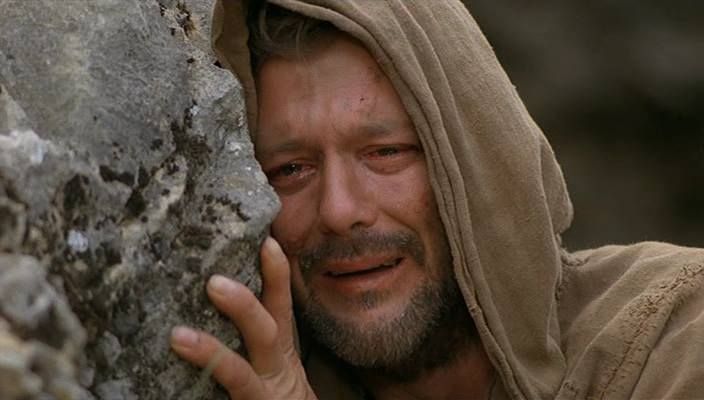

Another slump this cinematic season supplies an opportunity to turn back the clock.
This week I can warmly recommend Francesco (1989) — one of the most recent entries on the Vatican list of notable films — as a jolting, discomfiting, yet illuminating foray into the life of the beloved saint of Assisi.
The film is an Italian production but the original English dialogue and a cast of Anglophone actors lead one to expect some sort of slick Hollywood feature — which by all accounts it is not.
The dialogue is choppy and conspicuously overdubbed. The narrative jumps jaggedly between episodes with an almost epileptic sense of urgency. The acting is clunky and emotionally supercharged. Yet for all of this, I am inclined to describe the film as a masterpiece which captures the genius of the man’s spirituality as potently and evocatively as any work of art I know.
One of the most distracting elements of the production is the casting. Francis is played by American bad boy Mickey Rourke, whose performance alternates between a kind of manic antsy-ness and a somehow even more disconcerting olympian calm.
Helana Bonham Carter’s role as Saint Clare is perhaps even more discombobulating. For contemporary audiences, the purity and integrity of St. Francis’ feminine counterpart will probably be retrospectively sullied by associations with the actress’ later (and somehow more convincing) performances as the malodorous Bellatrix Lestrange in the Harry Potter films and as the middle aged profligate Princess Margaret in seasons three and four of The Crown.
The combination of these actors creates the overall impression of a St. Francis who is stalked by a tainted angel, tugged about by jerky interior tumult, and ceasely embroiled in exterior controversies he can never quite manage to escape. It all sounds rather tendentious and perhaps even overwrought, and maybe it is.
But it also certainly is not boring, as depictions of the saints too often are.
This is perhaps because it is tempting to look back on a saint long after the fact as a fait accompli, a static finished triumph of sanctity. Yet it is perhaps the chief accomplishment of this flawed, masterful film that it captures something of what might be described as the genuine drama of sanctification.
In Francesco the saint’s progress towards holiness conveys a sense of being prodded barefoot over raw terrain. This Francis struggles — and it is a struggle to watch — all the way to the epiphanic moment of the stigmata.
Yet when he gets there, it does not feel unapproachably alien or sentimental — as portrayals of such moments so easily can — but fitting, even earned. This Francis attains a glory that is the fruit of an agony, his resurrection is inseparable from the cross and for this reason it is believable.
Compare this presentation with the other Vatican list film on the same subject, The Flowers of St. Francis (1950), and instantly conspicuous is an absence of the almost transcendent composure and sustained otherworldliness of the earlier work.
Whereas both movies portray their titular figure as someone not of this world, the Francis in Flowers embodies this serenely, his toes scarcely seeming to touch the gently caressed dust of earth. The Francis in Francesco, by contrast, is a red-blooded son of the soil who seems tormented by an inescapable sense of calling.
Each film, Flowers and Francesco, gives us a different St. Francis, yet both, plausibly, show us something about the mystery that is the man.
Indeed, outward composure and interior untidiness might well be equal elements in the personality of a saint who seems, from the perspective of a purely this-worldly practicality, romantic and idealistic to a fault.
Patron of poets and dreamers who will never feel quite at home in this world, St. Francis and his followers stand ever ready to disrupt the too cozy comforts of those of us who do.
In like manner, something about the consistently inconsistent character of this effective piece of spiritual filmmaking communicates at an almost visceral level an intimation of the theology at its heart.
Everything about Francesco may be just a little out of sync. Yet rather like the extraordinary person it depicts, all these conspicuous failures might just amount to something better than success, that is, a hint at the possibility of a life built upon an apparent impossibility, which turns out to be just as factual as it is miraculous.
